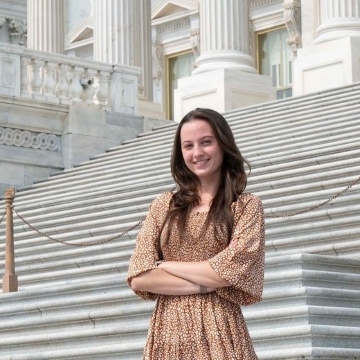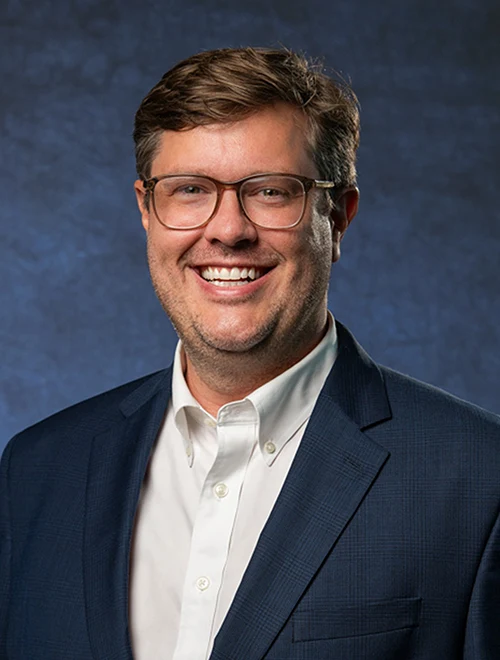Interdisciplinary Studies, B.A.
Cross disciplines. Connect Ideas. Create Insight.

“We are not students of some subject matter, but students of problems. And problems may cut right across the boundaries of any subject matter or discipline.”
K.R. Popper, Conjectures and Refutations: The Growth of Scientific Knowledge
What is Interdisciplinary Studies?
Shape your academic journey around your passions, your goals, and your future career.
The B.A. in Interdisciplinary Studies, offered by the College of Liberal Arts, gives students the opportunity to design a major that reflects their unique interests and career goals. But it's more than just a personalized degree program. At its core, the IDS program is grounded in the belief that some questions are too complex to be addressed by a single methodology or disciplinary perspective.
Interdisciplinary Studies is built on a philosophy of integration and collaboration that reflects and responds to the real world. Students in the IDS program explore big ideas and prepare for the complexities of the modern world by learning to integrate the perspectives, tools, and methods of multiple academic fields.
Through the IDS program, students will:
- develop a nuanced understanding and respect for multiple disciplines
- combine knowledge and methods from at least two disciplines
- collaborate with faculty and peers across traditional academic boundaries
- learn to appreciate the interdependence of disciplinary knowledge
- integrate their insights and experiences to develop a personal expertise
Whether you're passionate about public health, environmental policy, digital storytelling, social justice, or something else entirely, Interdisciplinary Studies equips you to think broadly, connect ideas, and create a degree program that is truly your own.
This degree program is available on the Oxford and regional campuses.
The Value of Interdisciplinary Studies
Learning across disciplines cultivates the intellectual curiosity, adaptability, and critical thinking skills essential for success in today’s workplace and in graduate or professional school. Interdisciplinary Studies students graduate with the ability to engage complex ideas, understand diverse value systems, and collaborate across fields. They learn not just to solve wicked problems, but to understand them from multiple perspectives. No matter which areas of study they combine, IDS students leave the university with the core competencies of a liberal arts education—strong communication, creative problem-solving, and the ability to work effectively with people from a wide range of backgrounds.
Interested in finding out more? Complete the IDS Program Interest Form below to start the process.
On this Page…
Program Information
Degree
B.A. in Interdisciplinary Studies
Required Credit Hours
120
Program Type
Major
School
Duration
4 Years
Degree Requirements
Find out about credit hour and course requirements from the 2025-26 academic catalog.
Students in the College of Liberal Arts earning the B.A. degree have a common set of 48-50 hours of general education. The specific courses taken to complete the categories of general education may differ between majors.
Categories of General Education:
- First Year Writing I, II
- English Literature Survey
- Modern or Ancient Language
- History
- Additional Humanities
- Fine or Performing Arts Appreciation
- Mathematics
- Social Sciences
- Natural Sciences
To see the details for these general education requirements, visit the UM online catalog or the degree sheet attached at the top of this webpage.
A B.A. in Interdisciplinary Studies consists of 48 credit hours, including a 6-hour core and a 42-credit-hour approved plan of study. The plan of study must include 21-27 hours at the 300 level or higher (depending on the disciplines chosen) and at least 18 hours from the College of Liberal Arts. Students must achieve a grade of C or better in each course included in the plan of study.
Required courses:
- IDS 101: Introduction to Interdisciplinary Studies
- IDS 499: Interdisciplinary Studies Capstone Seminar
Option A
Students construct a 42-credit-hour plan of study around a unifying theme or problem consisting of at least two disciplines with no more than 21 credit hours in the same discipline. A minimum of 18 credit hours must come from the College of Liberal Arts.
Option B
Students construct a 42-credit-hour plan of study around a unifying theme consisting of two minors and complementary courses appropriate to the theme. One of the minors must come from the College of Liberal Arts. At least 6-12 hours in each minor must be at the 300 level or higher (depending on the discipline chosen).
The University of Mississippi offers a degree program in both interdisciplinary and multidisciplinary studies. The key difference between the two lies in how the disciplines are approached and applied.
Multidisciplinary Studies involves studying multiple fields from their individual perspectives, without necessarily integrating or combining them. Students explore each discipline separately, gaining broad and diverse knowledge without focusing on how those areas might intersect.
Interdisciplinary Studies, on the other hand, requires the intentional integration of knowledge across disciplines to create new insights or to solve complex problems. In interdisciplinary work, students synthesize methods and perspectives from multiple fields to develop a deeper, more holistic understanding of the issue they care about.
| Interdisciplinary Studies (IDS) | Multidisciplinary Studies (MDS) |
Approach | Integrates multiple fields around a central question or theme | Explores multiple fields independently, without requiring integration
|
Purpose | Creates new understanding to address complex issues by synthesizing knowledge across disciplines | Broadens knowledge across disciplines to support flexible career paths
|
Curriculum Design | A cohesive plan of study with an interdisciplinary focus | Courses may reflect varied interests and goals without needing to connect
|
Ideal for Students Who | Want to explore connections between fields and desing a focused, inquiry driven major not offered at the university
| Prefer a broad, customizable major spanning diverse subject areas |
Degree Type | Bachelor of Arts (B.A.), College of Liberal Arts | Bachelor of Multi-Disciplinary Studies (B.M.D.S.), General Studies |
General Education Requirements | ||
Credits Required | 48 total credits: 6 core (intro and capstone), 42 individualized plan of study | 57 total credits: 3 minors (typically 15-21 hours each) + 3-hour capstone |
Not sure which program is right for you? Set up an appointment with Dr. Pfrenger to explore your options.
As an Interdisciplinary Studies student, you'll receive personalized guidance every step of the way. From the moment you join the program, you'll work one-on-one with the IDS program director to design a plan of study tailored to your interests, goals, and career aspirations.
Each semester, before your registration window opens, youll meet with the program director to:
- Review your academic progress
- Discuss GPA and degree requirements
- Make any adjustments to your plan of study
- Select courses aligned with your individualized plan
While students must follow the requirements outlined in the UM, the IDS director is your primary resource for navigating policies, resolving issues, and ensuring you stay on track for graduation.
If you are interested in becoming an Interdisciplinary Studies student? Here's how to get started:
Step 1: Fill out the interest form.
Step 2: Schedule an appointment with Dr. Pfrenger and discuss whether IDS is the right fit for you.

Interdisciplinary Studies Director
As Director of Interdisciplinary Studies, I’ll serve as your guide and mentor throughout your time in the program, working closely with you to develop an academic path that reflects who you are and where you want to go.
Dr. Andrew Pfrenger
Director of Interdisciplinary Studies
What can you do with an Interdisciplinary Studies degree?
There are countless career paths open to our graduates because of the wide range of emphasis area combinations available through the Interdisciplinary Studies program.
Whether you’re blending health sciences with psychology, law with ethics, or media with business, you’ll graduate with the ability to integrate knowledge from each discipline, collaborate in diverse teams, and approach problems with creativity and flexibility.
Here are some examples of emphasis areas that combine complementary disciplines to prepare you for a range of exciting careers and graduate programs.
Recommended Disciplines:
- Biology
- Chemistry
- Psychology
- Public Health
- Society and Health
- Nutrition
- Ethics or Philosophy
- Sociology or Anthropology
- Communication
- Foreign Language
Possible Career Paths:
This pathway offers flexibility and breadth while preparing your for the MCAT and covering your professional school requirements.
- Medical or dental school
- Physician assistant or nursing programs
- Veterinary, pharmacy, or optometry school
- Graduate programs in public health or bioethics
- Health policy, healthcare technology, or patient advocacy
Understand and support the needs of individuals and communities through a blend of social, behavioral, and health sciences.
Recommended Disciplines:
- Biological Science
- Chemistry
- Psychology
- Neuroscience
- Sociology
- Public Health
- Social Work
- Communication Sciences & Disorders
- Applied Gerontology
- Child Advocacy Studies
Possible Career Paths:
Combining insight into human behavior, health systems, and communication can lead to a wide range of careers.
- Counseling and mental health services
- Social work or case management
- Health education and community outreach
- Nonprofit or advocacy work
- Nonprofit or NGO Worker
- Graduate programs in public health, counseling, or social work
- Allied Health Professional (e.g., OT/PT prep)
Address urgent global challenges like climate change, conservation, and disaster preparedness by combining scientific, policy, and human-centered perspectives.
Recommended Disciplines:
- Environmental Science
- Disaster Sciences
- Public Policy
- Political Science
- Geography
- International Studies
- Geology
- Sociology
- Economics
- Psychology
- Society and Health
- Public Health
Career Paths:
This emphasis equips students to work on the front lines of sustainability and environmental resilience in a variety of fields.
- Environmental consulting or advocacy
- Sustainability planning
- Emergency and disaster response coordination
- Public sector or nonprofit policy work
- Environmental law or urban planning
Explore how systems of power, policy, and culture shape our world.
Recommended Disciplines:
- Political Science
- Philosophy or Ethics
- English
- Sociology
- Anthropology
- History
- Psychology
- Criminal Justice
- Gender Studies
- Law Studies
- International Studies
- Environmental Studies
- Freedom Studies
- African American Studies
- Latin American & Caribbean Studies
- East Asian Studies
- Southern Studies
Career Paths:
Prepare yourself for careers in justice, reform, advocacy and public service.
- Law school or legal advocacy
- Human rights or social justice work
- Government or public administration
- Journalism or investigative reporting
- Nonprofit leadership and grant writing
Harness creativity and critical thinking across multiple forms of expression—from visual arts and performance to digital media and cultural studies.
Recommended Disciplines:
- Digital Media Studies
- Art or Art History
- Cinema or Theatre Studies
- Media Studies
- English or Professional Writing
- Journalism
- Music
- Marketing or Communication
Career Paths:
This emphasis suits students pursuing careers where storytelling, creativity, and design meet real-world impact.
- Marketing, PR, or digital media
- Arts administration or creative direction
- Film, TV, or stage production
- Publishing or journalism
- Graduate programs in communication or media studies
Meet Some Recent Graduates
Meet a few Interdisciplinary Studies Alums
See where an Interdisciplinary Studies major can take you.
Interdisciplinary Studies Alumni
- VP and Director, Trustmark National Bank
- Professional Baseball Player, Washington Nationals
- Marketing Manager, Telluride Historical Museum
- Real Estate Agent, Kitchens Realty
- President, United Federal Logistics
- Nurse, Methodist Healthcare
- Orthopedic Surgeon, University of Florida Health
- Youth Minister, Parkway Baptist Church
- Director of IT, Baptist Memorial Health Care
- 7th grade Language Arts, DeSoto County School
- VP Government Relations, Kennesaw State University
- Legislative Director, US House of Representatives
Welcome to the College of Liberal Arts
As Coordinator of Student Recruitment for the College of Liberal Arts, I work with students, and their parents, who are interested in attending UM for their undergraduate degrees. I coordinate personalized visits to our departments, answer questions about the majors and programs in the CLA and handle all recruitment communications from the CLA. Please feel free to send me any questions you may have. It is my job to make sure you have everything you need to make an informed decision on where to spend your college career, and I hope it will be with the College of Liberal Arts at the University of Mississippi!
Annabelle Harris
Admissions Counselor
Future CLA Students

College of Liberal Arts Undergraduate Students
We invite future undergraduates to learn about the College of Liberal Arts, the value of the liberal arts education, our programs, career opportunities, and resources to help you succeed. You can also request a personalized degree sheet.
Next Steps
Explore Affordability
We have a variety of scholarships and financial aid options to help make college more affordable for you and your family.
Apply to the University of Mississippi
Are you ready to take the next step toward building your legacy?





